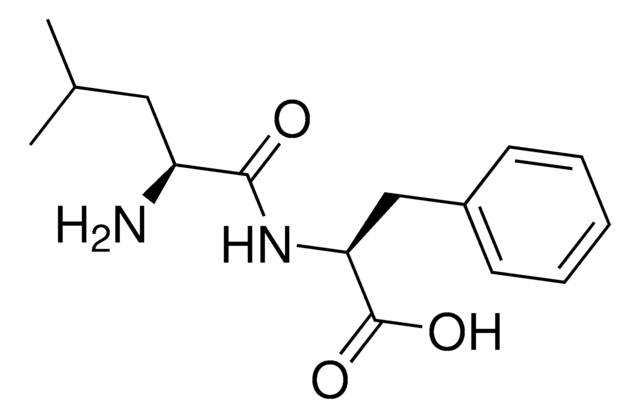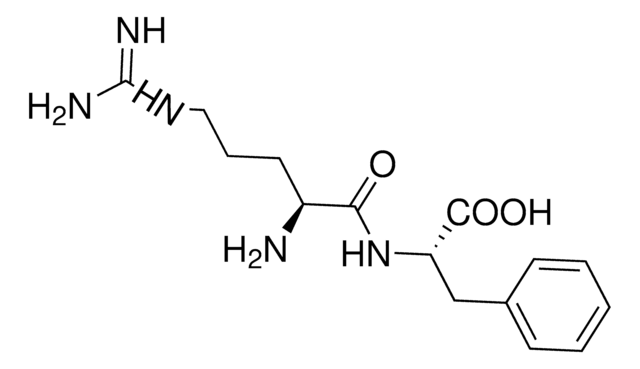All Photos(1)
About This Item
Empirical Formula (Hill Notation):
C7H14N2O3S
CAS Number:
Molecular Weight:
206.26
EC Number:
MDL number:
UNSPSC Code:
12352202
PubChem Substance ID:
NACRES:
NA.26
Recommended Products
product name
Met-Gly,
Assay
≥98% (TLC)
Quality Level
form
powder
color
white
storage temp.
−20°C
SMILES string
OC(CNC([C@@H](N)CCSC)=O)=O
InChI
1S/C7H14N2O3S/c1-13-3-2-5(8)7(12)9-4-6(10)11/h5H,2-4,8H2,1H3,(H,9,12)(H,10,11)/t5-/m0/s1
InChI key
QXOHLNCNYLGICT-YFKPBYRVSA-N
Biochem/physiol Actions
Met-Gly is a dipeptide.
Storage Class Code
11 - Combustible Solids
WGK
WGK 3
Flash Point(F)
Not applicable
Flash Point(C)
Not applicable
Certificates of Analysis (COA)
Search for Certificates of Analysis (COA) by entering the products Lot/Batch Number. Lot and Batch Numbers can be found on a product’s label following the words ‘Lot’ or ‘Batch’.
Already Own This Product?
Find documentation for the products that you have recently purchased in the Document Library.
Olga B Morozova et al.
The journal of physical chemistry. B, 113(20), 7398-7406 (2009-05-15)
Time-resolved chemically induced dynamic nuclear polarization (CIDNP) was applied to the investigation of the photo-oxidation of two sulfur containing peptides, glycylmethionine (Gly-Met) and methionylglycine (Met-Gly). It was established that the reaction of Gly-Met with a photosensitizer, triplet 4-carboxybenzophenone, occurs via
J C Matthews et al.
Journal of animal science, 73(11), 3464-3475 (1995-11-01)
The absorption of carnosine, methionine, and methionylglycine (using 35S-methionine and 35S-methionylglycine as representative markers) across ruminal and omasal epithelia collected from four (carnosine) and seven sheep (methionine and methionylglycine) were studied using parabiotic chambers that were repeatedly sampled over a
Justin Kai-Chi Lau et al.
Journal of the American Society for Mass Spectrometry, 24(4), 543-553 (2013-02-27)
Radical cations [Met-Gly](•+), [Gly-Met](•+), and [Met-Met](•+) have been generated through collision-induced dissociation (CID) of [Cu(II)(CH3CN)2(peptide)](•2+) complexes. Their fragmentation patterns and dissociation mechanisms have been studied both experimentally and theoretically using density functional theory at the UB3LYP/6-311++G(d,p) level. The captodative structure
Urszula Rychlewska et al.
Acta crystallographica. Section C, Crystal structure communications, 66(Pt 2), m51-m54 (2010-02-04)
Crystallographic analysis of a solid solution of two diastereoisomers, i.e. ({(1S,R)-1-carboxy-3-[(R,S)-methylsulfinyl]propyl}aminocarbonyl)methanaminium tetrachloridoaurate(III) and ({(1S,R)-1-carboxy-3-[(S,R)-methylsulfinyl]propyl}aminocarbonyl)methanaminium tetrachloridoaurate(III), (C(7)H(15)N(2)O(4)S)[AuCl(4)], has shown that in the presence of gold(III), the methionine part of the Gly-D,L-Met dipeptide is oxidized to sulfoxide, and no coordination to the
Snežana Rajković et al.
Bioinorganic chemistry and applications, 2018, 3294948-3294948 (2018-06-02)
Dinuclear platinum(II) complexes, [{Pt(en)Cl}2(μ-qx)]Cl2·2H2O (1), [{Pt(en)Cl}2(μ-qz)](ClO4)2 (2), and [{Pt(en)Cl}2(μ-phtz)]Cl2·4H2O (3), were synthesized and characterized by different spectroscopic techniques. The crystal structure of 1 was determined by single-crystal X-ray diffraction analysis, while the DFT M06-2X method was applied in order to
Our team of scientists has experience in all areas of research including Life Science, Material Science, Chemical Synthesis, Chromatography, Analytical and many others.
Contact Technical Service








